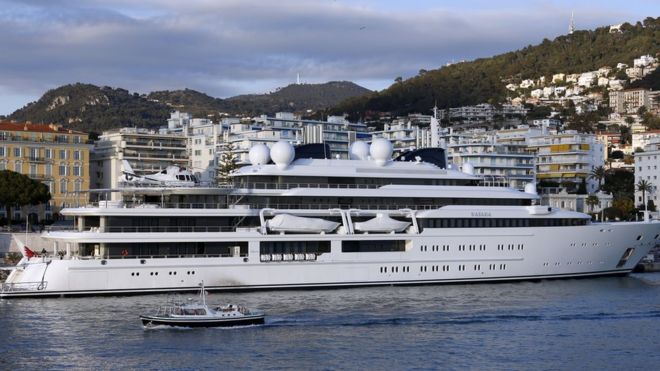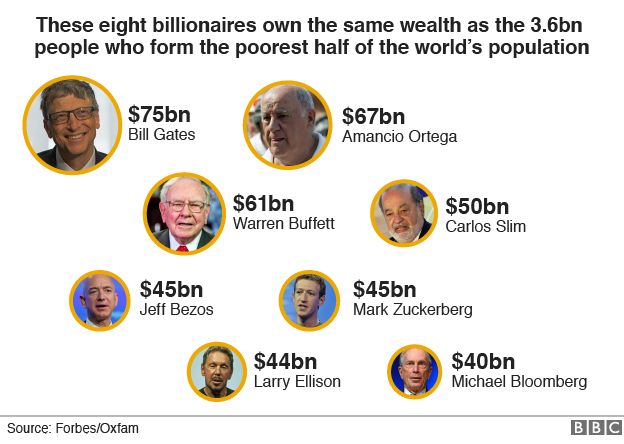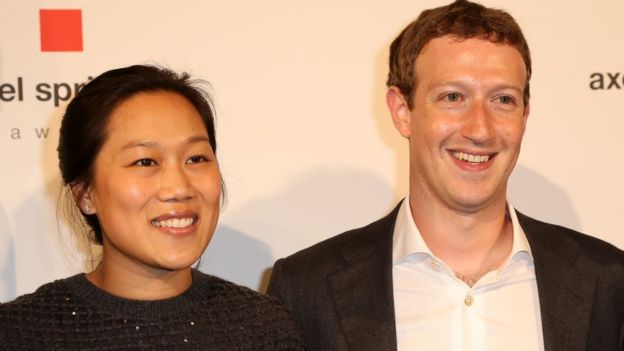- 2 hours ago
- Business
 GETTY IMAGES
GETTY IMAGES
The world's eight richest individuals have as much wealth as the 3.6bn people who make up the poorest half of the world, according to Oxfam.
The charity said its figures, which critics have queried, came from improved data, and the gap between rich and poor was "far greater than feared".
Oxfam's report coincides with the start of the World Economic Forum in Davos.
Mark Littlewood, of the Institute of Economic Affairs, said Oxfam should focus instead on ways to boost growth.
"As an 'anti-poverty' charity, Oxfam seems to be strangely preoccupied with the rich," said the director-general of the free market think tank.
For those concerned with "eradicating absolute poverty completely", the focus should be on measures that encourage economic growth, he added.
Ben Southwood, head of research at the Adam Smith Institute, said it was not the wealth of the world's rich that mattered, but the welfare of the world's poor, which was improving every year.
"Each year we are misled by Oxfam's wealth statistics. The data is fine - it comes from Credit Suisse - but the interpretation is not."
'Elite gathering'
The annual event in Davos, a Swiss ski resort, attracts many of the world's top political and business leaders.
Katy Wright, Oxfam's head of global external affairs, said the report helped the charity to "challenge the political and economic elites".
"We're under no illusions that Davos is anything other than a talking shop for the world's elite, but we try and use that focus," she added.

The world's eight richest billionaires
1. Bill Gates (US): co-founder of Microsoft (net worth $75bn)
2. Amancio Ortega (Spain): founder of Zara owner Inditex (net worth $67bn)
3. Warren Buffett (US): largest shareholder in Berkshire Hathaway (net worth $60.8bn)
4. Carlos Slim Helu (Mexico): owner of Grupo Carso (net worth $50bn)
5. Jeff Bezos (US): founder and chief executive of Amazon (net worth $45.2bn)
6. Mark Zuckerberg (US): co-founder and chief executive of Facebook (net worth $44.6bn)
7. Larry Ellison (US): co-founder and chief executive of Oracle (net worth $43.6bn)
8. Michael Bloomberg (US): owner of Bloomberg LP (net worth $40bn)
Source: Forbes billionaires' list, March 2016
UK economist Gerard Lyons said focusing on extreme wealth "does not always give the full picture" and attention should be paid to "making sure the economic cake is getting bigger".
However, he said Oxfam was right to single out companies that it believed fuelled inequality with business models that were "increasingly focused on delivering ever-higher returns to wealthy owners and top executives".
Oxfam's Ms Wright said economic inequality was fuelling a polarisation in politics, citing Donald Trump's election as US president and the Brexit vote as examples.
'Fair share'
"People are angry and calling out for alternatives. They're feeling left behind because however hard they work they can't share in their country's growth," she said.
The charity is calling for "a more human economy" and is urging governments to crack down on executive pay and tax evasion and impose higher taxes on the wealthy.
It also wants business leaders to pay a "fair share of tax" and has urged companies to pay staff the "living wage", which is higher than the government's National Living Wage.
Oxfam has produced similar reports for the past four years. In 2016 it calculated that the richest 62 people in the world had as much wealth as the poorest half of the global population.
The number had fallen to just eight this year because more accurate data was now available, Oxfam said.
It was still the case that the world's richest 1% had as much wealth as the rest of the world combined, Oxfam said.
 GETTY IMAGES
GETTY IMAGES
Some of the eight richest billionaires have given away tens of billions of dollars. In 2000 Bill Gates and his wife Melinda set up a private foundation that has an endowment of more than $44bn.
In 2015 Mark Zuckerberg and his wife Priscilla Chan pledged to give away 99% of their net worth in their lifetimes, which equated to about $45bn based on the value of Facebook shares at the time.
It takes cash and assets worth $71,600 to get into the top 10%, and $744,396 to be in the top 1%.
Oxfam's report is based on data from Forbes and the annual Credit Suisse Global Wealth datebook, which gives the distribution of global wealth going back to 2000.
The survey uses the value of an individual's assets, mainly property and land, minus debts, to determine what he or she "owns". The data excludes wages or income.
The methodology has been criticised as it means that a student with high debts, but with high future earning potential, for example, would be considered poor under the criteria used.

